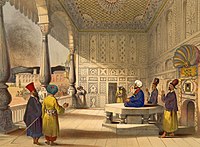
Back عبد الحي حبيبي Arabic عبد الحى حبيبى قندهارى ARZ عبدالحی حبیبی AZB Abdul Hai Habibi German Abdul Hai Habibi Spanish عبدالحی حبیبی Persian Abdul Hai Habibi NB عبدالحی حبيبي Pashto/Pushto Хабиби, Абдулхай Russian
Abdul Hai Habibi | |
|---|---|
| Native name | عبدالحی حبیبی |
| Born | 1910 Kandahar, Afghanistan |
| Died | May 9, 1984 (aged 73–74) Kabul, Afghanistan |
| Occupation | Historian, politician, scholar, professor |
| Subject | History and academia |
| Website | |
| www | |
| History of Afghanistan |
|---|
 |
| Timeline |
Abdul-Hai Habibi (Pashto: عبدالحى حبيبي, Persian: عبدالحی حبیبی, romanized: Abd 'ul-Ḥay Ḥabībī) (1910 – 9 May 1984) was a prominent Afghan historian for much of his lifetime as well as a member of the National Assembly of Afghanistan (Afghan Parliament) during the reign of King Zahir Shah.[1] A Pashtun nationalist from Kakar tribe of Kandahar, Afghanistan, he began as a young teacher who made his way up to become a writer, scholar, politician and Dean of Faculty of Literature at Kabul University.[2][3] He is the author of over 100 books but is best known for editing Pata Khazana, an old Pashto language manuscript that he claimed to have discovered in 1944; but the academic community does not unanimously agree upon its genuineness.[4]
- ^ Reddy, L. R. (2002). Inside Afghanistan: end of the Taliban era?. APH Publishing. p. 73. ISBN 978-81-7648-319-3. Retrieved 30 September 2010.
- ^ Saikal, Amin (2006). Modern Afghanistan: a history of struggle and survival. I.B.Tauris. p. 110. ISBN 978-1-84511-316-2. Retrieved 30 September 2010.
- ^ "Lesmiserables, les Afghans". Dr Fazal-ur-Rahim Marwat. TheFrontier Post and RAWA. 4 September 1998. Retrieved 27 September 2010.
- ^ Lucia Serena Loi: Il tesoro nascosto degli Afghani. Il Cavaliere azzurro, Bologna 1987, p. 33